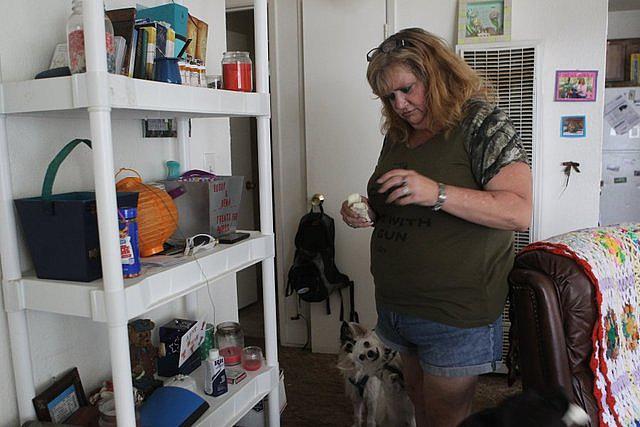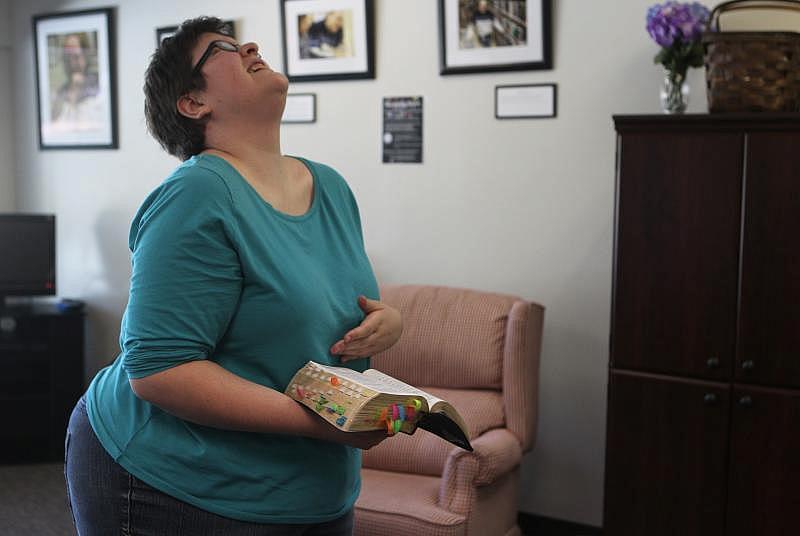Managing mental illness in rural Northern California: Two women share their stories
This story, originally published in the Record Searchlight, was produced as a project for the California Health Journalism Fellowship, a program of the USC Annenberg School for Communication and Journalism. The series examines the fragmented and overwhelmed mental health system in Shasta County and how its failings impact patients and public safety and contribute to the problem of homelessness.
Other stories in this series include:
Limited care available for mental health patients in rural Shasta County

Sami Corona, of Burney, gives her service dog Behr a treat.
Inside her Burney duplex, Sami Corona stuffs as many plush toys as she can into her handmade purse — a repurposed T-shirt with the arms cut off and the bottom tied together — as she gets ready to leave for Circle of Friends.
She’s teaching a class at the mental health support group this spring day — the stuffed animals will soon become “stash jars” with a secret compartment inside their fuzzy bellies to hold money, jewelry — anything a thief might want. The group, which meets several times a week, serves as a bridge between doctor visits for those with mental health issues in Burney. There, they teach one another lessons, provide support and turn an empathetic ear to those facing similar struggles.
For Corona, who lives with bipolar disorder, teaching arts and crafts lessons with the group is the ticket.
“If I don’t do arts and crafts every day …” Corona trails off. “Arts and crafts calm me down. They take up my time for me.”
Her duplex sits on a quiet street just feet away from where the town’s namesake pioneer lies buried. Samuel Burney — “Killed by Indians,” 1857, his pale, marbled gravestone reads.
“There’s nothing to do in Burney. I mean, there’s a bowling alley, ” Corona said.
Corona walks every day, and she’s lost almost 75 pounds in the months since she moved to Burney. Some of that was from stress, though. After all, tragedy is what forced Corona’s move to Burney — her home in Hat Creek burned down in the Eiler Fire, and she’d already been struggling with depression before the fire took her home away and killed her three cats.
“At that point, I didn’t want to leave the trailer,” she said. “I was safe in there.”
‘JUST NOT ENOUGH SERVICES’
Corona grabs two sweaty cans of Coke from the fridge and heads outside to wait for a Circle employee to pick her up since she doesn’t drive.
She goes to Circle a few times a week. Routines like that protect her mental health. She also has brunch every Sunday with friends who sit around the small table where she keeps her craft supplies.
“That helps, having a set engagement every week,” she said. “I look forward to it.”
She’s going back to church weekly, too. Prayer helps her feel better.
But she also needs more traditional mental health services. She goes to therapy at Hill Country every other week and sees a psychiatrist at Pit River Health Services once a month.
“Right now, I’m doing pretty good,” she said. “I haven’t had any manic episodes in the last couple months.”
Panic attacks still come, though — sometimes daily. Corona stopped taking medication for them a few months ago because she realized she’d been sleepwalking.
At Pit River, where Corona sees a doctor for her medications, she’s been switched to a new one several times.
“It sucks ... because you build up trust … then they switch it on you and you have to start it all over,” she said. “And they don’t know where you’re coming from. And so it’s like, ‘What am I even doing here?’ I wish there were more choices here.”
There’s Circle of Friends, but it’s only part-time, Corona points out.
Corona remembers when she was diagnosed 18 years ago. She thought she was having a heart attack every day at 2:15 p.m. sharp.
“What happens at 2:30?” the doctor asked her.
Her foster-niece came home from school, Corona said, and they had a strained relationship.
“That’s when I realized,” she said, “what they were.”
MANAGING WITHOUT A MAGIC PILL
Corona does take medication for her bipolar disorder. She still has manic and depressive episodes, but she says the pills make her bouts less severe.
Sometimes Corona realizes she’s having an episode, but other times she pieces it together in hindsight.
“Depending on the day, I can’t get dressed. I won’t put on my makeup. I won’t brush my hair,” she said, stroking one of the stuffed animals. “It’s like you have to force yourself ... then you have to force yourself to find clean clothes, get dressed and start cleaning up. And it’s not easy.”
Bipolar doesn’t make relationships easy, either.
“I’ve been lucky enough to have two, which, when you’re bipolar, having one relationship is hard enough. (Some) don’t even know what a relationship is,” she said. “So I know I’m one of the lucky ones.”
Down the hall, the sign that marked her family’s home in Hat Creek now hangs on the wall. It’s a miniature house that was white before, but Corona painted it blue to cover the scars from the fire.
“So I just had to redo it,” she said.
KIMBERLY
Kimberly Davis sits at the head of the table in her family’s Burney home, a binder in front of her with a book placed neatly on either side. 
“Brother Joseph,” one of them is called. The other is the Book of Mormon. The binder is full of her prep-work to become a missionary for the Church of Jesus Christ of Latter-day Saints.
Davis, 27, was baptized into the church less than a year ago (12-13-14: an easy date for her to remember), but she’s fiercely dedicated to becoming a missionary. The location doesn’t matter.
“It’s wherever the prophet sends me,” she explains. “I can’t help but feel like there’s somebody out there waiting for me to help them.”
Not long ago, Davis was the one in need of help: like Corona, she suffers from bipolar disorder.
“I struggled with a lot of stuff for a lot of years,” she said. “I realized … ‘I have a problem. Normal people don’t act this way.’ ... The day that I was diagnosed was one of the best days of my life.”
While she takes medication and sees a counselor, religion is a major part of her recovery plan.
“My strength now comes from knowing I am the daughter of a loving, heavenly father,” she said. “It really helped me to know that.” ‘I AM ABLE TO HELP OTHER PEOPLE ...’
Even with treatment and faith, Davis says she struggles with mood swings caused by her disorder, particularly last spring.
“No matter how many resources you have, how strongly you believe in something, there’s always going to be those trials,” she said.
But she sees her mental health issues as a path to strength.
“I know that if I hadn’t gone through what I’ve went through, I wouldn’t be where I am right now,” she said.“It’s these trials that made me a strong person. I am tough, and I am able to help other people because of them.”
Still, her frustration at apparently still having to go through more is evident.
“When I finally think I’m getting a break, more bad things happen,” Davis said.
A few weeks ago she called one of the elders from the church, “bawling.”
“We talked it out,” Davis said. “As we know, when you don’t deal with things, it can really fester.”
Sometimes, Davis comforts herself by reading a passage about Joseph Smith’s lonely journey to Palmyra, New York, before his Mormon faith became a growing phenomenon.
“The path to Palmyra was anything other than direct,” she said. “Everyone thinks that happiness is not having any trials. Maybe these things happened to prepare us for things later on in life. Maybe God is preparing you for your mission. ... There’s always a blessing. You just have to look.”
For now, Davis is taking medication for her bipolar disorder. Like Corona, she accepts that mood flare-ups are still a part of life. But with the medication, Davis said, they’re not nearly as bad.
Davis jokes that she apologizes to her family in advance if there’s a problem at the pharmacy and she’ll have to temporarily go without. That’s not an excuse, though. She’s a firm believer that people need to keep their emotions in check.
She’s learned that she needs to keep reaching out to people, like she did with the church elder recently.
When Kimberly was at her worst, “It’s because I was sitting around doing nothing,” she said. “When you don’t want to do something, that’s when you have to do it.”
Davis steps away from the table to call for a ride to Circle of Friends.
She sits back down and picks up her church’s Articles of Faith.
“We believe in being honest, true, chaste, benevolent, virtuous, and doing good to all men ...” she begins to read.
THREE AGAINST THE WORLD
Besides church, Davis — an actress and singer — says her place is in theater.
“I love taking on different personas and pretending to be other people,” she said. “For the longest time, I didn’t know who I was.”
But Davis gets stage fright, and fears it will only be worse when she’s presenting herself as a missionary, since it’s so personal for her.
“I’m used to having characters to hide behind,” she said. “More often times than not (as a missionary), you’re going to be disappointed. I just have to keep remembering that.”
Still, Davis is determined to find people who need her and tell them what she already knows — if you’re in pain, that “doesn’t mean that’s how it’s going to be for the rest of your life.”
“You’ve just got to keep going, and you’ve just got to cling to the hope that things are going to get better, even if one day that’s all you’re clinging to, it’s the hope that they’re going to get better,” she said. “I can guarantee you that they’re going to get better, because I’ve experienced that, I don’t know how many times.”
Living with a mental illness doesn’t mean God is punishing you, either, Davis wants to tell people.
“A lot of them that I’ve met, you know, they’re not there by any circumstances of their own,” she said.“That’s why I think that having a belief system in place is so important. Because placing our worth as human beings (on things that happen on Earth) … it’s so dangerous. Those things can be taken away like that.”
If her message mostly falls on deaf ears, Davis is comforted by her faith that — even if the world is against her — it’s not against only her.
“It’s going to be me and God and my companion against the world.”
Related feature: Find mental health resources in Shasta County
[Photograph by Andreas Fuhrmann.]
